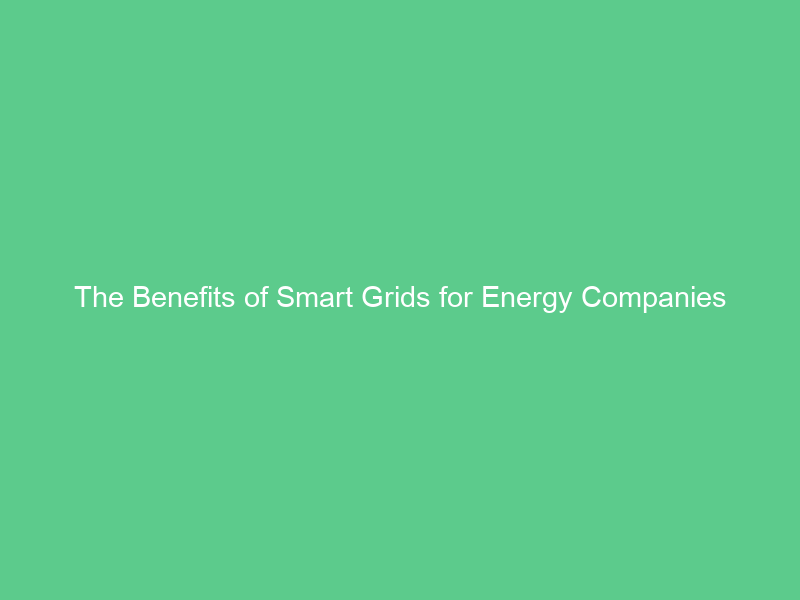Rising energy prices and changing regulations are driving energy companies to invest in grid modernisation projects. Smart grids utilize digital technology for real-time monitoring and control over existing infrastructure.
Intelligent networks optimize power distribution, integrate renewables, and serve as platforms for sustainable mobility – offering numerous advantages to end-users, suppliers, and the environment alike.
Improved Reliability and Efficiency
Providers, utilities, and the global energy industry depend upon reliable electricity supplies as a key goal. Smart grid technology offers one solution to enhance this essential network by embedding computing intelligence in devices and equipment to optimize performance, manage energy consumption, ensure safety and security measures and meet environmental goals.
Smart grids differ from traditional networks by featuring real-time monitoring and self-healing abilities that facilitate better energy efficiency and more reliable power supply, while providing customers with an improved customer experience, reduced economic losses, and increasing business productivity.
Smart grid technology enables more effective integration of renewable energy sources by optimizing energy flow and minimizing losses, leading to cost savings for utilities, consumers, reduced carbon emissions, as well as enhanced consumer experiences by offering real-time information about energy use to motivate change in habits.
Reduced Carbon Emissions
Smart grids differ from conventional power generation systems in that they use renewable resources such as wind or solar to produce electricity, thus decreasing carbon emissions, helping protect the environment by decreasing greenhouse gas concentrations and pollutants that damage the ozone layer.
Energy providers can leverage smart grid technology to implement demand response programmes that encourage consumers to reduce consumption during peak times, relieving strain on the grid and possibly leading to reduced electricity rates. Furthermore, smart grid can allow electric vehicle (EV) drivers to charge their vehicles during off-peak periods, further relieving grid stress while decreasing electricity costs.
As the energy industry changes and adapts, smart grid technologies will play a pivotal role in providing sustainable, flexible, reliable, and affordable energy solutions. Solutions providing secure interoperability between components as well as robust data analysis are crucial in building resilient smart grids that support market efficiencies, boost productivity and support the transition toward low carbon economies.
Increased Flexibility
With increasing energy demands, increased efficiency levels and new renewable technologies on the rise, maintaining equilibrium between supply and consumption is more challenging than ever. Smart grids offer autonomous response mechanisms for sudden spikes or drops in energy availability to minimize outages while mitigating any negative consequences associated with power outages that do occur.
Key to this flexibility lies within a strong communication network that offers both consumers and energy companies real-time data about electricity consumption, enabling dynamic pricing models. Furthermore, such an infrastructure facilitates integration of prosumers – users who produce energy while simultaneously consuming it – into the equation.
With a smart grid, information can travel in both directions to help avoid power disruptions due to weather or other external factors. Furthermore, utilities can quickly restore supplies after storms have passed without risk of extended outages in particular areas – helping minimise damage done to homes, businesses, and public services due to severe weather events.
Improved Customer Service
Smart grid technologies give energy companies a much deeper understanding of the real-time power demands that affect them, helping to reduce peak demand and bring down electricity rates for everyone.
Power outages have also become much easier to detect. By combining sensors, advanced metering infrastructure, and predictive analytics with each other, utilities are able to pinpoint the source of outages more accurately, thus providing customers with more precise information.
Data collected by smart meters and other devices allows us to enhance energy efficiency, optimize network loads and manage renewable energy more effectively – saving consumers money while decreasing greenhouse gas emissions and improving reliability of energy supply.
However, the public does not always receive clear and consistent messages on what smart grids are and their benefits. This may be partially caused by stakeholders using different terms for smart grid technology – leading to potential confusion for those trying to understand what smart grid means for them.

